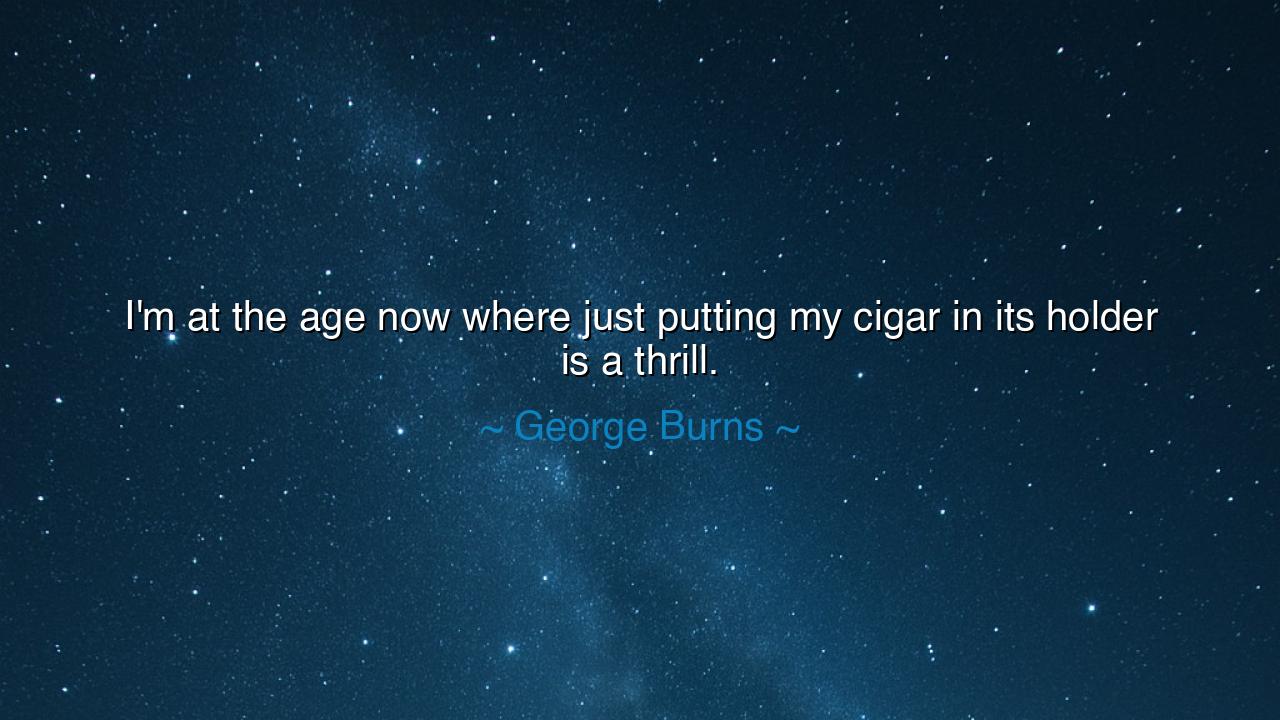
I'm at the age now where just putting my cigar in its holder is a






The words of George Burns—“I’m at the age now where just putting my cigar in its holder is a thrill.”—rise from the lips of an old man who has lived long enough to find joy in the simplest acts. At first glance, his words seem humorous, as was the way of Burns, the legendary comedian who lived to be a hundred. Yet beneath the laughter lies a wisdom as enduring as the ember of the very cigar he speaks of. His quote is not merely a jest about the frailty of old age; it is a hymn to gratitude, a celebration of endurance, and a reminder that contentment does not come from grand achievements but from the ability to delight in life’s smallest gestures.
Born in 1896, George Burns came of age in a world that changed more in one lifetime than many civilizations did in centuries. He knew poverty, loss, and reinvention. He rose from the streets of New York as a vaudeville performer, found fame with his partner and beloved wife Gracie Allen, and watched as the world transformed—from stage to radio, from radio to television, from black-and-white to color. Through it all, he survived, often by laughing at life’s hardships before they could laugh at him. By the time he spoke these words, he was a man who had outlived nearly everyone he loved, yet he carried no bitterness. His humor became a shield against despair and a torch of endurance. When he said that “just putting my cigar in its holder is a thrill,” he was really saying: To still be here, to still draw breath, to still find pleasure in something small—this is a victory.
The ancients understood this kind of wisdom well. Cicero, the Roman philosopher, wrote that “old age is the crown of life,” not because of power or strength, but because it teaches appreciation. Youth seeks thrill in conquest; age finds it in survival. Burns’s cigar becomes a symbol of presence—of being alive long enough to still savor a ritual he has known all his life. To him, the act is not trivial but sacred. The very act of lifting the cigar, steadying his hand, and feeling its warmth is a declaration: I am still here. In the laughter of the old man, there is a whisper of triumph—a soft yet profound defiance against the erosion of time.
In this way, Burns’s humor becomes a kind of philosophy, much like that of the Stoics. He reminds us that the secret to lasting happiness lies not in the ability to do more, but in the wisdom to enjoy less. As the body weakens, the spirit can still grow stronger, sharper, and lighter. His joke, like all great truths, teaches us how to reframe limitation into joy. To the young, such contentment might seem meager; to the wise, it is divine. The ability to find wonder in the ordinary is the highest form of enlightenment—one that cannot be learned in youth, but only through the patient education of time.
History is filled with souls who reached such understanding. Michelangelo, at eighty-seven, could barely lift a chisel, yet he continued to work on his sculptures, saying that every strike, however weak, brought him closer to God. Beethoven, deaf and frail, composed his Ninth Symphony in the silence of his own mind, hearing what others could not. And so, like Burns, they found beauty and meaning in what remained rather than mourning what had been lost. The true strength of the aged is not in vigor, but in perspective—the wisdom to find glory in what others overlook.
Burns’s humor also contains compassion. By making light of his frailty, he offers the young a mirror of truth softened by laughter. He shows that aging is not to be feared, but embraced. The thrill he speaks of is not mockery—it is gratitude distilled into wit. For in a world obsessed with youth and speed, he reminds us that slowing down is not a failure; it is an opportunity to notice what one once ignored—the warmth of a sunrise, the taste of a morning coffee, the comfort of memory. Joy, he teaches, is not something we chase; it is something we learn to see when all else slows.
Let this be the lesson drawn from his words: Do not wait until age to discover the beauty of simplicity. Learn now, in whatever season of life you stand, to take pleasure in the quiet acts that surround you. Laugh at your flaws, honor your endurance, and measure your days not by accomplishments, but by moments of genuine appreciation. If you can find joy in the ordinary, then no passing of years can rob you of your peace. Gratitude, like the smoke from Burns’s cigar, rises from the embers of contentment—it fills the air for a moment, but its scent lingers long after.
So, as George Burns reminds us with his trademark smile and twinkling eyes, the true art of living is not in doing everything, but in loving the little that remains. When you can lift your hand, breathe deeply, and smile at the smallest victories, you have conquered time itself. For one who can still take pleasure in simply placing a cigar in its holder has already mastered the final lesson of life: that joy is not in the years you count, but in the moments you cherish.






AAdministratorAdministrator
Welcome, honored guests. Please leave a comment, we will respond soon